Nhân NH sắp đi xa
30.
4. 2013
Sài Gòn 1963
Sài Gòn 1963
Ngô Đình Nhu
và Thư viện, Thư tịch
Blog NL (1)
NGÔ ĐÌNH NHU VỚI SỰ NGHIỆP LƯU TRỮ, CHÍNH TRỊ VÀ GIA ĐÌNH (2)
[Tít như Kít. Đúng là sỉ nhục chữ Mít. NQT]
Có thể, TV sẽ đi thêm 1 đường, là bài viết của Hitchens về cú Kennedy ra lệnh thịt Diệm & Nhu. Hitchens kết án, đúng là hành động của lũ găng tơ. Thú vị hơn, Orwell cũng dùng từ này, để chỉ, chính nước Anh của ông:
“Đế quốc Anh ở Miến Điện, là chủ nghĩa găng tơ”
"L'impérialisme britanique en Birmanie, c'est du gangstérisme"
Trở
về từ Việt NamBlog NL (1)
NGÔ ĐÌNH NHU VỚI SỰ NGHIỆP LƯU TRỮ, CHÍNH TRỊ VÀ GIA ĐÌNH (2)
[Tít như Kít. Đúng là sỉ nhục chữ Mít. NQT]
Có thể, TV sẽ đi thêm 1 đường, là bài viết của Hitchens về cú Kennedy ra lệnh thịt Diệm & Nhu. Hitchens kết án, đúng là hành động của lũ găng tơ. Thú vị hơn, Orwell cũng dùng từ này, để chỉ, chính nước Anh của ông:
“Đế quốc Anh ở Miến Điện, là chủ nghĩa găng tơ”
"L'impérialisme britanique en Birmanie, c'est du gangstérisme"
Sài Gòn 1963
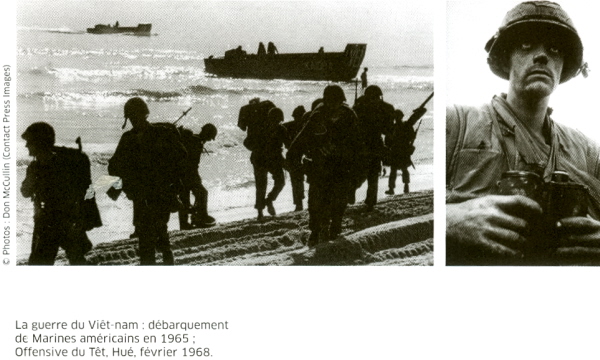
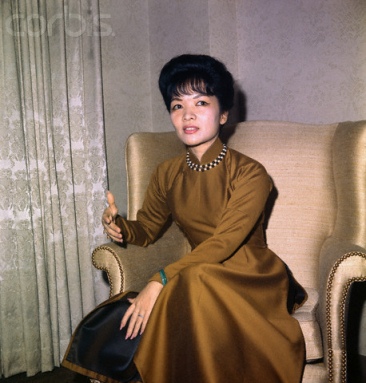 Hồi
ký Madame Nhu
Hồi
ký Madame Nhu
Đến bây giờ thì mọi người đều đã biết Bà Nhu chẳng có gì và cũng không ai có thể trưng ra được một bằng chứng Bà Nhu có của chìm của nổi ở ngoại quốc. Những năm đầu của kiếp lưu vong Bà Nhu và các con sống rất chật vật được gửi gấm ở nhờ gia đình một vị Bá Tước người Ý ở La Mã. Sau này mua được một căn nhà nhỏ bé ở Paris cũng do tiền tặng dữ gián tiếp của một người hảo tâm giầu có. Bây giờ c
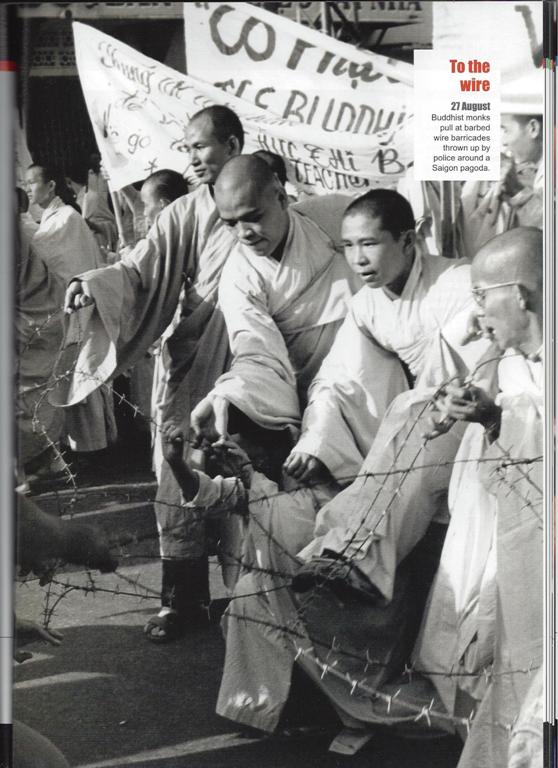
Xi [Sư] hay….Vi Xi ?
Phật Giáo có bao nhiêu phần trăm… VC nằm vùng,
và bao nhiêu phần trăm… tội, trong vụ làm mất Miền Nam?
Căng, nhe?

Diệm bị
Kennedy ra lệnh thịt, sau đó Mẽo đổ quân Đà Nẵng, hy vọng lập lại “Ngày
Dài Nhất”,
“Chúng làm như Normandie”, 1 tay phóng viên AFP lên Đài nói với Gấu. VC
chào mừng
bằng cú Mỹ Cảnh, Gấu dính trấu, ăn cả hai trái mìn của “bạn của Đào
Hiếu”! (1)
(1) Bữa
trước
K. có gửi cho Gấu, tên ông bạn quí này, không nhớ bỏ đâu mất!
Đến bây giờ thì mọi người đều đã biết Bà Nhu chẳng có gì và cũng không ai có thể trưng ra được một bằng chứng Bà Nhu có của chìm của nổi ở ngoại quốc. Những năm đầu của kiếp lưu vong Bà Nhu và các con sống rất chật vật được gửi gấm ở nhờ gia đình một vị Bá Tước người Ý ở La Mã. Sau này mua được một căn nhà nhỏ bé ở Paris cũng do tiền tặng dữ gián tiếp của một người hảo tâm giầu có. Bây giờ c

Xi [Sư] hay….Vi Xi ?
Phật Giáo có bao nhiêu phần trăm… VC nằm vùng,
và bao nhiêu phần trăm… tội, trong vụ làm mất Miền Nam?
Căng, nhe?
Wed, Apr 10,
2013 at 8:07 PM
thu tu Texas
Ong Tru,
Chi co ong viet nhu vay, nhung la su that !
Cam on Ong va chuc ong cung gia dinh binh an
Đa tạ. NQTChi co ong viet nhu vay, nhung la su that !
Cam on Ong va chuc ong cung gia dinh binh an
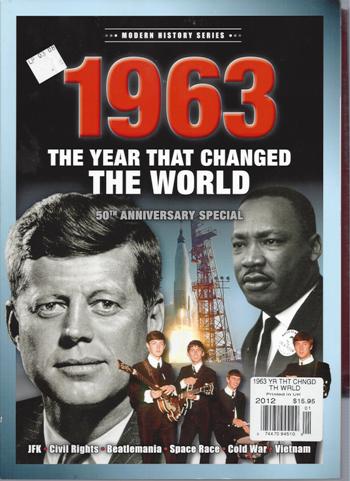
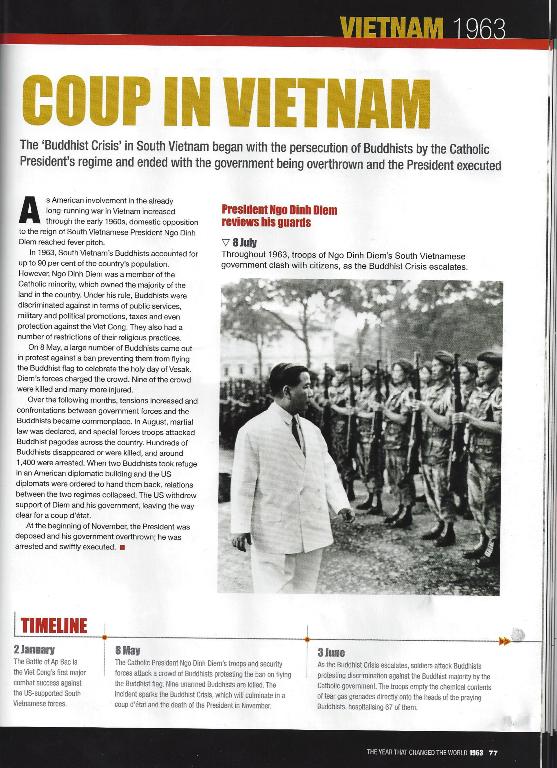
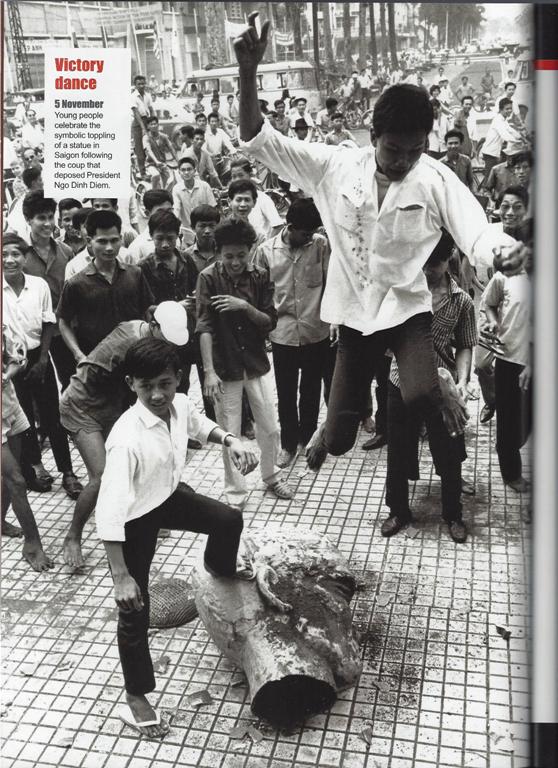
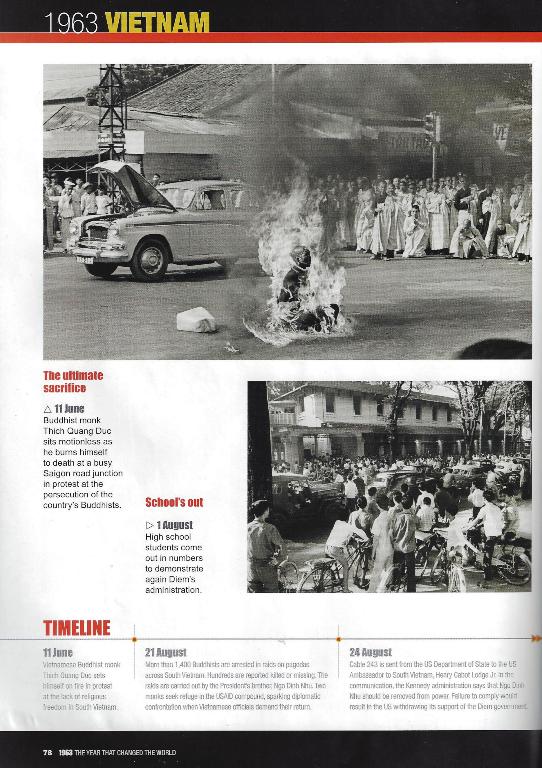
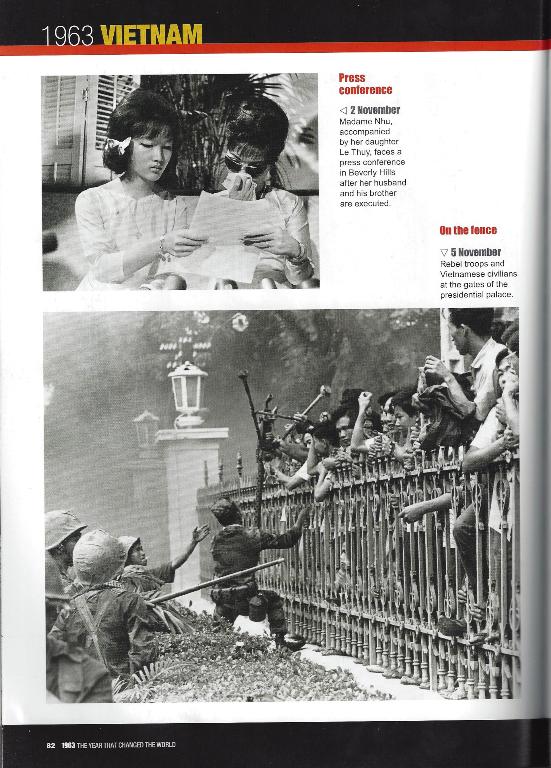
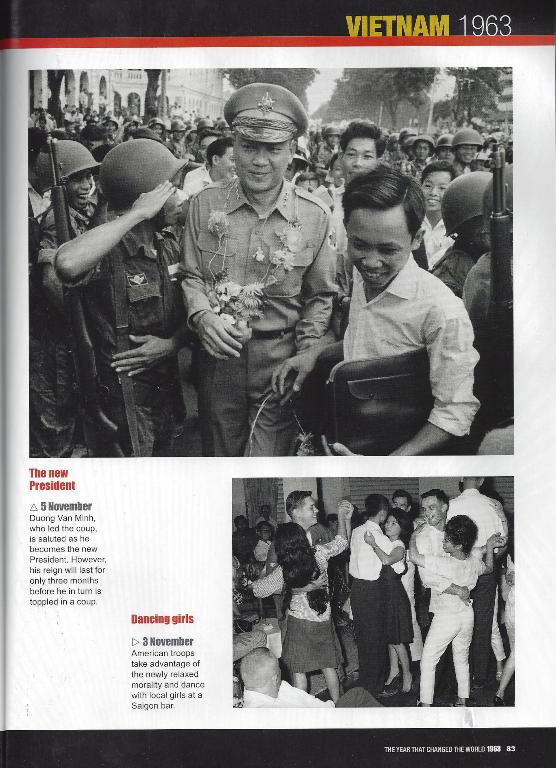
Society
The father of
mindfulness returns home to transition to the next life
BY LIAM FITZPATRICK/HUE, VIETNAM
AT A BUDDHIST TEMPLE OUTSIDE HUE, VIET- nam's onetime
capital, 92-year-old Thich Nhat Hanh has come to quietly "transition;' as
his disciples put it. The ailing celebrity monk-quoted by Presidents and hailed
by Oprah Winfrey as "one of the most influential spiritual leaders of our times"
- is refusing medication prescribed after a stroke in 2014. He lies in a villa
in the grounds of the 19th centuryTu Hieu Pagoda, awaiting liberation from the
cyclical nature of existence.
At the gate, devotees take photos.
Some have flown from Europe for a glimpse of Thay, as they call him, using the
Vietnamese word for teacher. Since arriving on Oct. 28, he has made several appearances
in a wheelchair, greeted by hundreds of pilgrims, though the rains and his
frailty have mostly put a stop to these. On a wet afternoon in December, the
blinds were drawn back so TIME could observe the monk being paid a visit by a couple
of U.S. diplomats. The Zen master, unable to speak, looked as though he could
breathe his last at any moment. His room is devoid of all but basic furnishings.
Born Nguyen Xuan Bao, he was banished in the 1960s, when the South Vietnamese
government deemed as traitorous his refusal to condone the war on communism. He
is now back in the temple where he took his vows at 16, after 40 years of
exile. Framed above the bed are the words tro
ve- "returning" -in his own brushstroke.
In the West, Nhat Hanh is sometimes
called the father of mindfulness. He famously taught that we could all be
bodhisattvas by finding happiness in the simple things-in mindfully peeling an
orange or sipping tea. "A Buddha is someone who is enlightened, capable of
loving and forgiving;' he wrote in Your
True Home, one of more than 70 books he has authored. “You know that at times
you're like that. So enjoy being a Buddha."
His influence has spread globally.
Christiana Figueres, the executive secretary of the U.N. Framework Convention
on Climate Change, said in 2016 that she could not have pulled off the Paris
Agreement "if I had not been accompanied by the teachings of Thich Nhat
Hanh." World Bank president Jim Yong Kim called Nhat Hanh's Miracle of
Mindfulness his favorite book.
The monk's return to Vietnam to end
his life can thus be seen as a message to his disciples. "Thay's intention
is to teach [the idea of] roots and for his students to learn they have roots
in Vietnam;' says Thich Chan Phap An, the head of Nhat Hanh's European
Institute of Applied Buddhism. "Spiritually, it's a very important decision.”
But practically, it risks reopening
old wounds. Other Vietnamese exiles were infuriated by highly publicized visits
Nhat Hanh made in 2005 and 2007, when he toured the country and held well- attended
services that made international headlines. To his critics, these tours gave legitimacy
to the ruling Communist Party by creating the impression that there was freedom
of worship in Vietnam, when in fact it is subject to strict state controls.
Other spiritual leaders have
suffered under the regime; Thich Quang Do, patriarch of the outlawed Unified
Buddhist Church of Vietnam (UBCV), has spent many years in jail or under house arrest.
In November, the U.S. Commission on International Religious Freedom (USCIRF),
the government panel that monitors freedom of religion globally, issued a
statement condemning his treatment by Hanoi. In this context, Vo Van Ai, a
Paris-based spokesman for the UBCV, said Nhat Hanh's prior visits to Vietnam "played
into the government's hands." The meaning of his return, therefore, carries
great freight here in Vietnam. "[It] symbolizes that both he and the type
of Buddhism he represents are fundamentally Vietnamese;' says Paul Marshall, professor
of religious freedom at Baylor University in Texas."For the government, this
is both a challenge and an opportunity. If he lives out his life in peace, they
can claim credit.”
NHAT HANH HAS ALWAYS GONE his own way.
He became a novice against his parents' wishes, then left a Buddhist academy
because it refused to teach modern subjects. He studied science at Saigon University,
edited a humanist magazine and established a commune.
After teaching Buddhism at Columbia
and Princeton universities from 1961 to 1963, he returned to Vietnam to become an
antiwar activist, risking his life with other volunteers to bring aid to
war-torn communities. He refused to take sides, making enemies of both North
and South Vietnam. His commune was attacked by South Vietnamese troops, and an
attempt was made on his life. In 1966, as the war escalated, he left Vietnam to
tour 19 countries to call for peace. He addressed the British, Canadian and
Swedish parliaments and met Pope Paul VI. This proved too much for the regime
in Saigon, which viewed pacifism as tantamount to collaboration with the
communists and prevented him from returning. The next time Nhat Hanh saw Vietnam
was during a visit in 2005. His reputation grew in exile. Hippies set his
antiwar poetry to music. In 1967, he was nominated by Martin Luther King Jr.
for the Nobel Peace Prize, and in 1969 he headed a Buddhist delegation
TODAY, THE MINDFULNESS THAT NHAT
HANH HELPED
PROPAGATE IS A $1.1 BILLION
INDUSTRY
to the peace talks in Paris. He eventually based himself in
southwest France, where he turned the plum Village Buddhist monastery into
Europe's largest, and established eight others from Mississippi to Thailand. He
oversaw the translation of his books into more than 30 languages. When Western
interest in Buddhism went through a revival at the turn of the century, Nhat
Hanh became one of its most influential practitioners.
Nhat Hanh taught that you don't
have to spend years on a mountaintop to benefit from Buddhist wisdom. Instead,
he says, just become aware of your breath, and through that come into the
present moment, where everyday activities take on a joyful, miraculous quality.
If you are mindful, or fully present in the here and now, anxiety disappears
and a sense of timelessness takes hold, allowing your highest qualities of
kindness and compassion to emerge.
This was highly appealing to Westerners
seeking spirituality but not the trappings of religion. Burned-out executives
and recovering alcoholics flocked to retreats in the French countryside to listen
to Nhat Hanh. An entire mindfulness movement sprang up in the wake of this
dharma superstar. Among his students was the American doctor Jon Kabat-Zinn,
founder of a mindfulness- based stress-reduction course that is now offered at
hospitals and medical centers worldwide. Today, the mindfulness that Nhat Hanh
did so much to propagate is a $1.1 billion industry in the U.S., with revenues
flowing from 2,450 meditation centers and thousands of books, apps and online
courses. One survey found that 35 of employers have incorporated mindfulness
into the workplace.
Nhat Hanh's approach has been commercially
successful partly because it makes few demands; at least of beginners-unlike
the more rigorous meditation advocated by that other great exponent of Buddhism
in the West, the Dalai Lama. "Thich Nhat Hanh provides a simple version of
Buddhism, but I would not say it is oversimplified,” explains Janet Gyatso,
Hershey Professor of Buddhist Studies at Harvard University's Divinity School.
The "basic philosophy is the same" as that of the Dalai Lama, she says.
"Mindfulness and compassion."
IN AN UNPUBLISHED INTERVIEW he gave to TIME in 2013, Nhat
Hanh declined to say if he wanted to return home or good. Instead he praised
Vietnam's youthful dissidents. "If the country is going to change, it will
be thanks to this kind of courage:' he said. "We are fighting freedom of
expression."
In fact, the situation for all
rights in Vietnam is critical. During Nhat Hanh's exile, hundreds of thousands
of people re sent to re-education camps or killed by a Communist Party that, today, has absolute
control. Activists are beaten, tortured and jailed. Rights of association are restricted,
as is the press and judiciary. Religious freedom is heavily curtailed, and the
official Buddhist Church of Vietnam is controlled by the state. To his critics,
the monk should have made greater use of his position to draw attention to
these abuses. Ai, the UBCV spokesman, says Nhat Hanh was "world- famous
abroad but longed to be famous in his homeland" and accuses him of cooperating
with the regime in order to be given permission for his 2005 tour. Hanoi
granted Nhat Hanh permission to visit that year as it sought Vietnam's removal
from the USCIRF list of Countries of Particular Concern (CPC), where it kept
company with North Korea, Iran and Saudi Arabia. The official communist daily
Nhan Dan quoted Nhat Hanh as saying, "The Vietnamese want to be liberated from
what the Americans call liberation for the Vietnamese," without explaining
that he had said these words decades earlier, in the entirely different context
of the Vietnam War. Washington obliged
Hanoi by removing Vietnam as a CPC in 2006, to the fury of nonconformists
forced into exile. "Many [who] had looked on Thich Nhat Hanh as a living
Buddha, with total respect and admiration, were deeply disappointed to see him
pandering to the communist authorities:' says Ai. Many in the Vietnamese
diaspora will not tolerate any compromise with Hanoi, explains Bill Hayton,
associate fellow of the Asia program at London's Royal Institute of International
Affairs. "In their eyes, Thich Nhat Hanh is a sellout because he is prepared
to work within the limits imposed by the Communist Party!'
But Nhat Hanh was not totally
silent. During his 2007 visit to Vietnam, he asked then President Nguyen Minh
Triet to abolish the Religious Affairs Committee, which monitors religious
groups. The plum Village annual journal of 2008 went further and called on
Vietnam to abandon communism. His followers paid a heavy price. In September
2009, police and a hired mob violently evicted hundreds of monks and nuns from
a monastery that Nhat Hanh had been allowed to build at Bat Nha in southeast
Vietnam, which had been attracting thousands of devotees. Yet if Nhat Hanh
courted controversy by engaging with the party, he also won the ability to gain
access to the Vietnamese people-and that might have been the goal all along.
The official Vietnamese Buddhist Church, says Hayton, "has no leader to
compare with Thich Nhat Hanh or his ideas of mindfulness!' During Nhat Hanh's
tours, he was able to champion a concise, modernized form of Buddhism very
different from the religion sometimes perceived as old-fashioned and arcane.
The impact is still felt by young Vietnamese today. In November, Linh Nhi, 27,
traveled from Saigon to keep vigil at Tu Hieu. "If I can meet him, that's
good," she told local media. "If not, I'm still happy because I can
feel his presence;' Buddhism teaches that Nhat Hanh needs to offer his
presence, and in doing so, he is embracing the roots of his suffering in the
Vietnam War. He is surely aware that Hanoi will make political capital out of
his homecoming. But the Zen master is evidently playing the long game-the
longest game of all, in fact, which is eternity. - With reporting by
SUPRIYA BATRA/HONG KONG and BRYAN
WALSH/NEW YORK
Time Feb 4/Feb 11, 2019
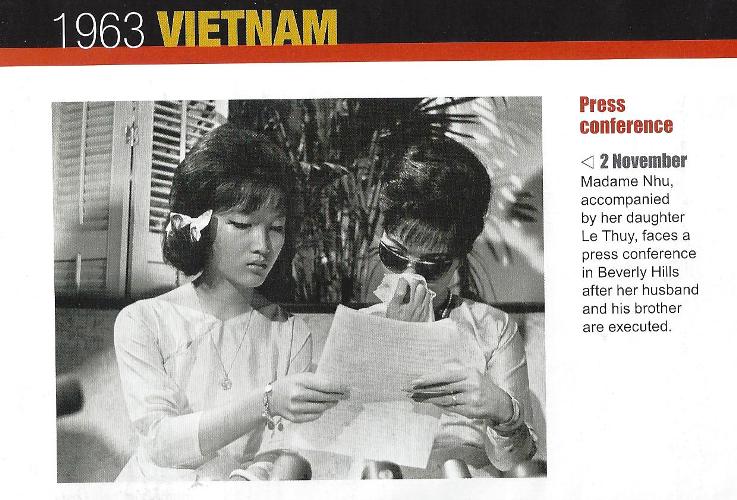
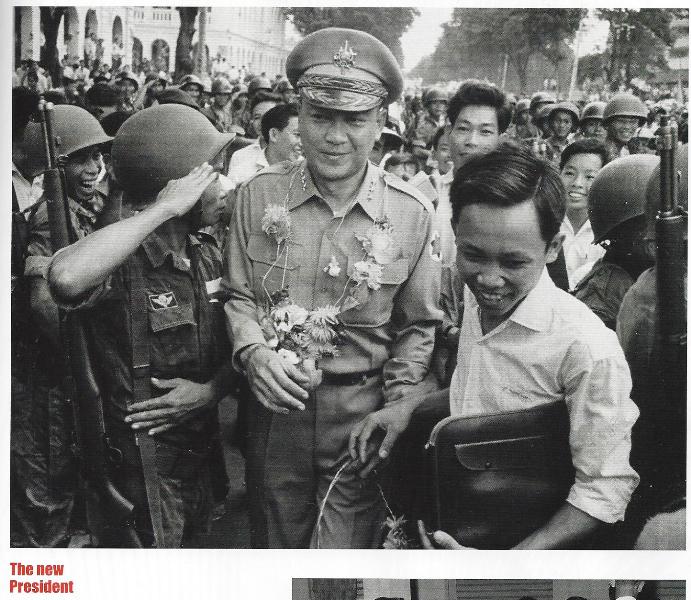

Ảnh là Tướng André Trần Văn Đôn, mà sao chú thích là DV Minh vậy anh?
ReplyDeleteSorry, mistaken
Delete